coModule: Autonomous e-bike premiers at Eurobike.
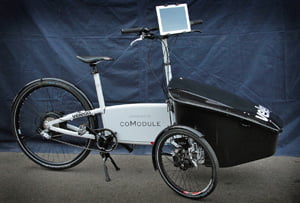 The Eurobike is the leading international show for the bicycle industry. This year confirmed the electrification of the sector. This advent of electric two-wheeled mobility is increasingly teasing automotive suppliers to enter the Light Electric Vehicle (LEV) game but also attracts young innovators. coModule falls into both categories. In Friedrichshafen, the Berlin-based start-up presented the world’s first autonomous electric cargo bike controlled via app. Nora Manthey gave it a tilt and tap while meeting the entrepreneurs.
The Eurobike is the leading international show for the bicycle industry. This year confirmed the electrification of the sector. This advent of electric two-wheeled mobility is increasingly teasing automotive suppliers to enter the Light Electric Vehicle (LEV) game but also attracts young innovators. coModule falls into both categories. In Friedrichshafen, the Berlin-based start-up presented the world’s first autonomous electric cargo bike controlled via app. Nora Manthey gave it a tilt and tap while meeting the entrepreneurs.
***
From batteries to boats to bikes
coModule is founded in 2013 by young Estonians. While building electric race cars as part of the Formula Student Team Tallinn, they soon “fell in love with emission-less propulsion,” CEO Kristjan Maruste remembers. His passion led him to look closer at the e-mobility industry.
The first business idea however, revolved around weldless batteries Maruste tried to sell to the electric boat sector. The young entrepreneur soon had to find out that the market for energy storage was highly competitive and well-guarded. Nevertheless, he also learned that the “e-boat owners and manufacturers were craving visualisation,” as the young Estonian puts it. The skippers and builders were desperate to see what was actually going on in the propulsion system.
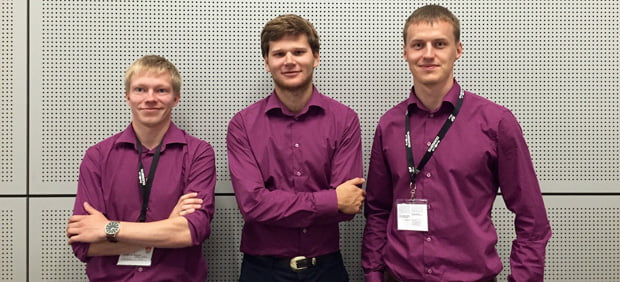
It is this idea of visualisation and connectivity coModule is based upon. The core business of the mechatronics and developers is the actual ‘coModule’ – a hardware chip which is at the heart of what coModule calls its “connectivity platform for electric vehicle manufacturers.” The technology sends vehicle data to the user’s smartphone and allows to control different features from the mobile app, such as the motor and the lights for example. It can also serve as diagnostics and tracking tool for the vehicle manufacturer, enabling quicker product development and better client management.
Self-driving electric bike
coModule’s interest is thus not actually in autonomy but in software solutions for light electric vehicles. The start-up’s competence is in building platforms that let manufacturers and suppliers connect their offerings with the consumer at the heart of the business.
To demonstrate the ability of the coModule technology the prototype autonomous e-bike was created. It is based on an electric cargo bike by Veleon, another young company whose founder, Julius Adomeit, learned his trade in automotive engineering. By cooperating, both Adomeit and Maruste say they wish to initiate a discussion that goes beyond mere cycling and into the future of what they understand as “mobility” with “transport units” tapping into new markets. Those LEVs would then sit between cars and standard bikes.
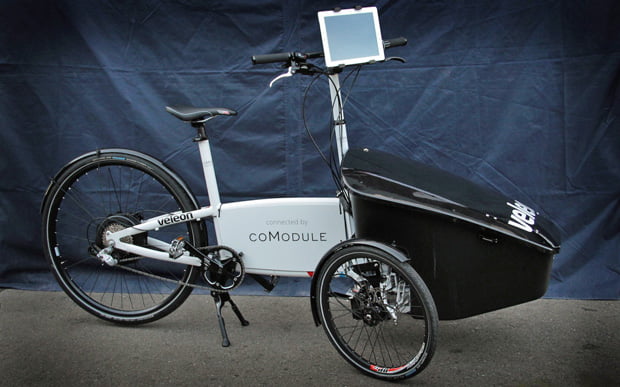
The autonomous electric bike shown at Eurobike is driven by a Heinzmann motor, the same drive unit Deutsche Post uses in their electric cargo bikes. The electric Veleon is equipped with two additional stepper motors to steer the two front-wheels as soon as the mobile phone is tilted.
When trying the app, the wheels were a little slow to react to the turning and tilting of the mobile phone. However, at no more than six kph this was not a safety issue. Forward movement of the electric three-wheeler is initiated by virtually pushing a red dot forward on the mobile’s screen. Again, it took a little while to find the right pressure to literally point the bike forward via the Android phone. Developer Stemo Ojavee had no such problems or simply a little more practice.
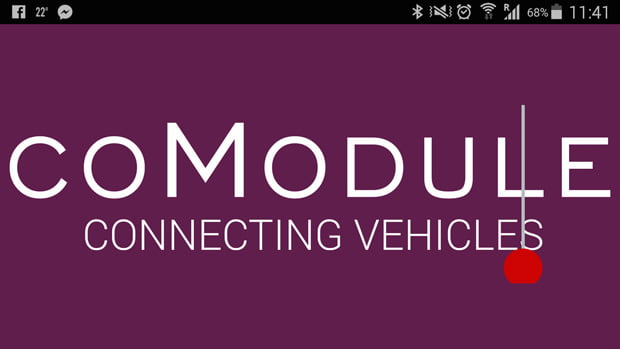
Currently, the autonomy of the e-bike is bound to active control by the owner. More mature creations might see a “follow-me” function. For the bike to drive fully autonomously, safety sensors would need to be added as they are missing on the demo bike.
Future applications
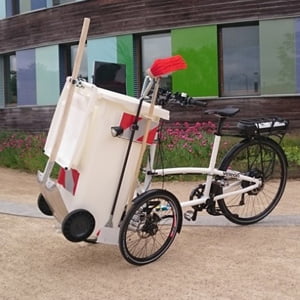 The start-up is not alone in the development of (semi-)autonomous electric bikes – also Ford and Baidu, the Chinese equivalent to Google, are looking into LEVs that do not necessary require a passenger. Hence, coModule is supported by Startupbootcamp, an accelerator funded by Bosch, Cisco, Siemens and Mercedes Benz among others.
The start-up is not alone in the development of (semi-)autonomous electric bikes – also Ford and Baidu, the Chinese equivalent to Google, are looking into LEVs that do not necessary require a passenger. Hence, coModule is supported by Startupbootcamp, an accelerator funded by Bosch, Cisco, Siemens and Mercedes Benz among others.
Electric vehicles such as the autonomous Veleon could make some serious “changes in the lives of people,” coModule founder Maruste believes. Zero-emission pizza deliveries is a rather worldly application while rental bikes that autonomously return to their station is another. In terms of crisis however, emergency supplies on bikes could reach people in remote areas without risking lives.
With demonstrator vehicles such as the Veleon, the future of mobility that connects both the automotive and LEV world, feels just a tap away.
— Nora Manthey
The prototype specc:
– coModule embedded electronics (UART/I2C/SPI/CANBus/RS485 communication, Bluetooth LE, accelerometer, GPS, GSM/GPRS)
– coModule Android application, which is used to move, turn and stop the bike
– Electric cargo bike by Veleon with Heinzmann e-bike motor
– ASI controller
– digital potentiometers
– 350 Wh batteries
– stepper motor 20W
– step-down regulators
– 25 deg turning angle

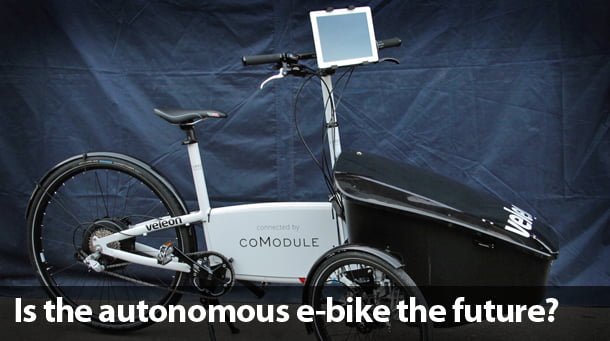
3 Comments